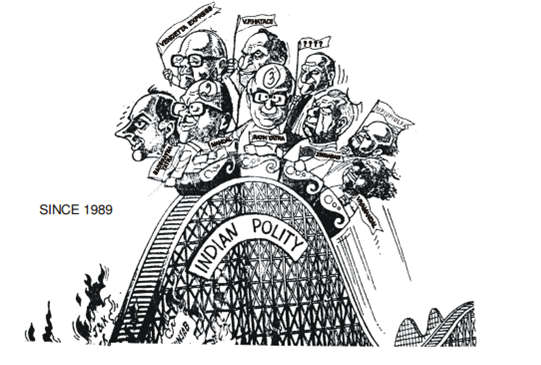 Short Answer Type
Short Answer TypeStudy the cartoon given below and answer the following questions : i. Identify any four national leaders from the above cartoon and mention the serial number of each.
i. Identify any four national leaders from the above cartoon and mention the serial number of each.
ii. Which was the most controversial issue of the period related to leader No.2 as Prime Minister of India ?
iii. What was the position of the party led by leader No.1 in the Lok Sabha elections of 1989 ?
 Long Answer Type
Long Answer TypeHighlight any three positive and three negative features each of the Soviet System in the Soviet Union.
OR
How far it is correct to say the international alliances during the Cold War era were determined by the requirements of the superpowers and the calculations of the smaller states ? Explain.
Analyse the three different views within India about the type of relationship India should have with the United States of America.
OR
Evaluate any three major factors responsible for making the European Union a political force from being an economic force.
Describe any three international challenging issues that can only be dealt with when all the countries work together.
OR
What is meant by traditional notion of external security ? Describe any two components of this type of security.
OR
In the traditional conception of security, the greatest danger to a country is from military threats. The source of this danger is another country which by threatening military action endangers the core values of sovereignty, independence and territorial integrity.
i. Balance of Power - When countries look around them, they see that some countries are bigger and stronger. This is a clue to who might be a threat in the future. For instance, a neighbouring country may not say it is preparing for attack. There may be no obvious reason for attack. But the fact that this country is very powerful is a sign that at some point in the future it may choose to be aggressive.
ii. Alliance building - An alliance is a coalition of states that coordinate their actions to deter or defend against military attack. Most alliances are formalised in written treaties and are based on a fairly clear identification of who constitutes the threat. Countries form alliances to increase their effective power relative to another country or alliance. Alliances are based on national interests and can change when national interests change.
The accommodation of regional demands and the formation of linguistic states were also seen as more democratic. Justify the statement with any three suitable arguments.
OR
Examine the different areas of agreement and disagreement with respect to the model of economic development to be adopted in India after independence.
Analyse the circumstances that favoured Indira Gandhi to become Prime Minister after the death of Lal Bahadur Shastri. Mention any four achievements of Indira Gandhi that made her popular as a Prime Minister.
OR
Analyse the circumstances responsible for the declaration of a state of emergency in India on 25th June, 1975.
Describe any six factors which made the farmers’ movement run by Bharatiya Kisan Union as the most successful popular movement.
OR
Which three lessons do we learn from regional aspirations and their accommodation as an integral part of democratic politics ? Describe.
